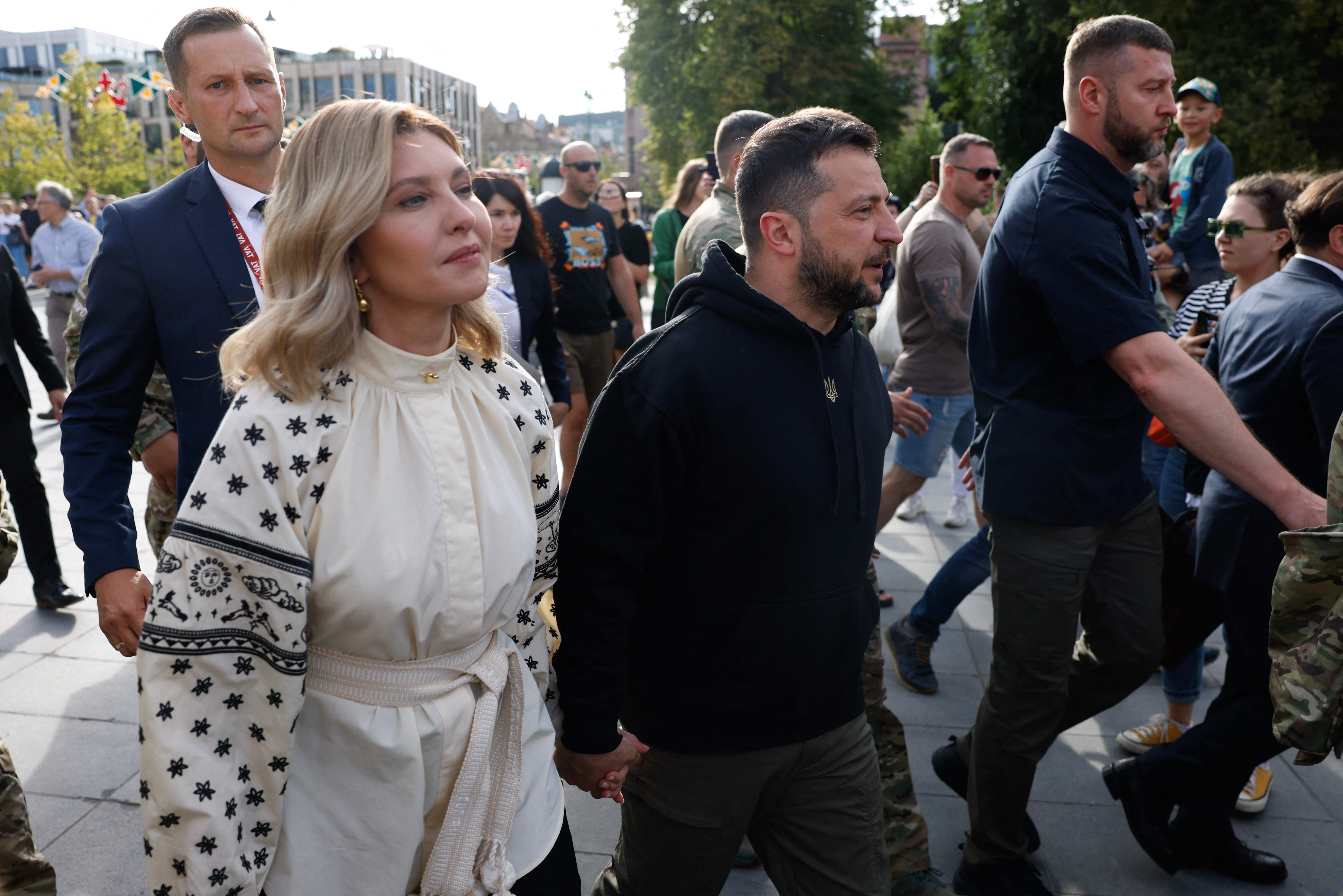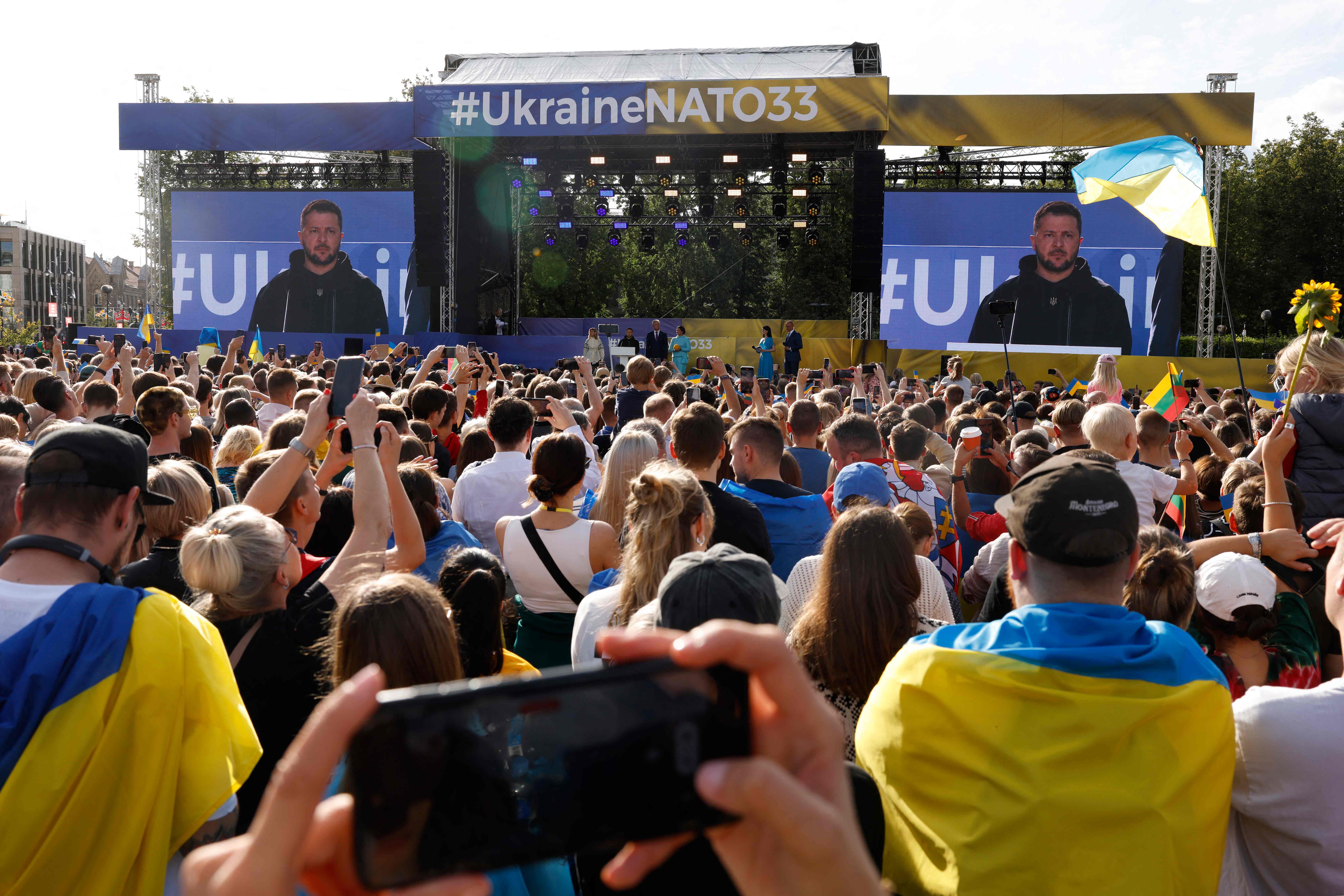Nato refuses to offer Ukraine timeframe on joining – after Zelensky hits out at ‘absurd’ delays
Alliance says Kyiv will be given membership ‘when allies agree and conditions are met’ – without saying what those conditions are
Nato leaders have refused to offer Ukraine a timetable or clear conditions for membership – a stance the country’s president Volodymyr Zelensky called absurd.
A communique released on the first afternoon of a two-day summit in Lithuania said only that Kyiv would join the alliance “when allies agree and conditions are met”.
It came despite Mr Zelensky denouncing delays to the process, accusing Nato of handing Russia “motivation” in its invasion.
“It’s unprecedented and absurd when [a] time frame is not set, neither for the invitation, nor for Ukraine’s membership,” he said as the summit began.
He also claimed the alliance was leaving a “window of opportunity” for Ukraine to be used as a bargaining chip in negotiations with its invaders and expressed anger at a “vague” draft agreement. “Uncertainty is weakness,” he said.
Later, Nato secretary general Jens Stoltenberg insisted the alliance had taken “key decisions at a critical moment” and that allies have agreed “a strong, united and positive message for Ukraine” as well as a “positive path forward for membership”.
Asked about Mr Zelensky’s concerns, Mr Stoltenberg said it was important to ensure that Ukraine wins the war because “unless Ukraine prevails, there is no membership to be discussed at all”.
“There has never been a stronger message from Nato at any time, both when it comes to the political message of the path forward for membership and the concrete support from Nato allies,” he said, adding that previous members had joined without a timeline. “They are conditions-based, have always been,” he said.

Mr Stoltenberg could not disguise the differences between the 31 members over Ukraine’s pathway to membership. Britain had been pushing for the US and other more hesitant allies, such as Germany, to agree to language signalling bolstered support for Ukraine to join, while many eastern European nations have pushed for swift resolution. However, all attendees – including Ukraine – agree the country cannot join during the war, as to do so would risk pulling the group into direct conflict with Russia.
Nato did not specify conditions Ukraine needs to meet, but said members would help Kyiv to make progress on military matters as well as on additional democratic and security sector reforms. The US, in particular, has been keen for Ukraine to make progress against corruption.
Later, speaking to a crowd of thousands in central Vilnius – many waving Ukrainian flags – Mr Zelensky’s disappointment was clear. “I embarked on a trip here with faith in decisions, with faith in partners, with faith in a strong Nato. In a Nato that does not hesitate, does not waste time and does not look back at any aggressor,” he said.
“And I would like this faith to become confidence – confidence in the decisions that we deserve – all of us deserve, and every warrior, every citizen, every mother, every child expects,” he added. “Is that too much to expect?”
President Joe Biden has stressed Nato needs to stay united. “I still think that President Putin thinks the way he succeeds is to break Nato and we’re not going to do that,” Mr Biden said.
Rishi Sunak told reporters that both Britain and Ukraine recognised Kyiv could not join the alliance “in the midst of a conflict”.
Mr Sunak said: “I’ve always said that Ukraine’s rightful place is in Nato and that we stand by the language of Bucharest in 2008. I think what is important at this summit is that that commitment is reaffirmed and also that there is demonstrable progress towards that goal.”
He also appeared to confirm reports Ukraine would be offered an "Israel-style" security deal, as part of a multi-year plan to defend itself from Russia. Mr Sunak told reporters he was “keen to try and get this over the line”.
He said it was “distinct from the Nato conversation” and would “send a very strong signal of deterrent to Putin, that he can't wait people out, in terms of this conflict”.
The UK and its G7 allies will agree a new framework to guarantee Ukraine’s long-term security on Wednesday, in a system that has been dubbed “Nato-lite”.
Under the plans, Ukraine receives more defence equipment, intelligence, support for cyber and hybrid threat defences as well as expanded training programmes. The move will also help develop Ukraine’s industrial base.
The UK will also announce new support for Ukraine, including thousands of extra rounds of ammunition for Challenger 2 tanks and more than 70 combat and logistics vehicle.
As the war takes its toll on Ukraine’s military resources there will also be a £50m package to help repair equipment and a new military rehabilitation centre will be established.
Mr Sunak said countries were “stepping up our formal arrangements to protect Ukraine for the long term”.
Wednesday will also see the first meeting of the new Nato-Ukraine Council.
Western nations continued to pledge arms and monetary support to Ukraine’s fight against Russia. President Emmanuel Macron said France would begin supplying long-range cruise missiles, following a similar announcement by Britain.
With a range of 250km (155 miles), the missiles nearly triple Ukraine’s previous capabilities, allowing forces to hit Russian troops and supplies deep behind the front lines. Defence secretary Ben Wallace said Ukraine has already “successfully” used the UK missiles, known as Storm Shadow.

Germany, too, announced new aid worth €700m (£600m), including two Patriot air defence missile launchers, and more tanks and fighting vehicles.
A coalition of 11 nations will also start training Ukrainian pilots to fly F-16 fighter jets in August in Denmark, and a training centre will be set up in Romania.
The summit was also buoyed by the prospect of Sweden joining as its newest member after Turkish president Tayyip Erdogan abruptly dropped his objections to the move, while pushing to revive talks for Turkey to join the European Union. Finland also attended the summit as a member for the first time after its own entry into the alliance in April.
Moscow, which has disingenuously cited Nato’s eastern expansion as a factor in its decision to invade Ukraine, said Europe would be the first to face “catastrophic consequences” should the war escalate.
“Potentially, this issue [of Ukraine joining Nato] is very dangerous for European security... and therefore those who will make the decision must be aware of this,” said Kremlin spokesperson Dmitry Peskov.
Join our commenting forum
Join thought-provoking conversations, follow other Independent readers and see their replies
Comments
Bookmark popover
Removed from bookmarks